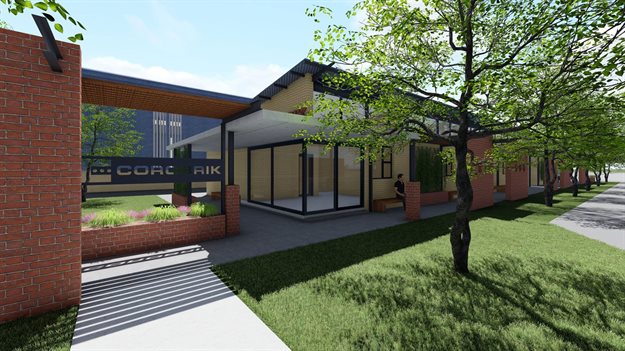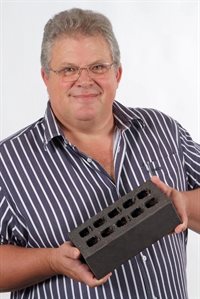Corobrik's investment into its SA manufacturing plants over the next two years is set to pass the R1bn mark as it readies its new R800m mega factory in Driefontein for full production and begins to build a second new plant in KwaZulu-Natal.

Driefontein plant rendering
Speaking at the second South African Investment Conference earlier this month, chief executive of Corobrik Dirk Meyer said that the company had invested R550m in its new Driefontein plant to date and would inject a further R250m into the project during 2020. An additional R200m would also see the company build a new manufacturing facility to the north of Durban to augment production at its current plant.
Following the conference, Meyer confirmed that design work for the new R200m KZN factory had already been completed and that negotiations were underway to purchase land for the new operation.
As soon as the Driefontein plant was up and running, work would begin on the new KZN plant which would take about a year to complete and was likely to be in production by 2022, he said.
Environmentally friendly facility
Turning to the Driefontein facility, one of the most environmentally friendly facilities of its kind in Africa, Meyer said that the structure looked “extremely impressive” now that the exterior of the plant had been completed. The first kiln and drier were complete and construction of a second kiln and drier was well underway. The clay preparation machinery and extruders are also in place and installation of the cutting and wet packaging and dehacking machinery had also commenced, he said.
“Next year, we intend to start commissioning the first kiln and drier and, from January onwards, we will be doing dry runs. From September onwards, we will be dry commissioning our second kiln and drier. The idea is to be in full production by November,” he said.
Meyer said that the project, which had gone extremely smoothly and would be delivered within budget and on time, had been largely financed from the essentially debt-free company’s balance sheet.

Driefontein plant rendering
1,000 jobs have been created during construction of the Driefontein facility with a further 60 permanent positions to be created as the factory comes on stream. Meyer said that 30 members of the local community had been trained and employed to lay bricks during construction, providing them with a marketable skill going forward.
“What is particularly important about this project is that, whilst we are using German intellectual property, most of the building and construction is being done by South African companies.”
Sustainability ethos
The Driefontein factory will generate at least 20% of its electricity needs from renewable resources, natural gas consumption for the kilns would be reduced by at least two -thirds and the carbon footprints of both kilns would be substantially reduced. This sustainability ethos will also be rolled out to other plants with Corobrik retrofitting some with the same new kiln technology going forward.

Dirk Meyer, chief executive, Corobrik
According to Meyer, Corobrik’s R1bn spend would also ensure that the company remained relevant as a key stakeholder both within the construction industry and the broader South African business environment.
Strategic investment
“This is undoubtedly a strategic investment that transcends any economic cycles. Most of our factories have a useful life of at least 40 years. If we do not invest, our business will not grow. Instead, we are investing at the right time to take advantage of future improvement in the economy.”
Meyer said that, as an investor, Corobrik had taken a long-term rather than a short-term view and had faith in government’s strategies to turn the economy around. He said the market had contracted significantly during the first quarter of 2019 and remained flat since then. No major change was expected for most of 2020 although recovery was likely to begin towards the end of next year or at the beginning of 2021.


































